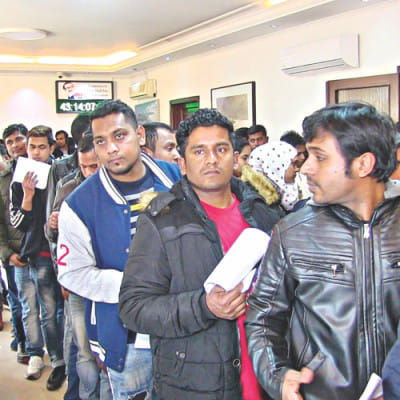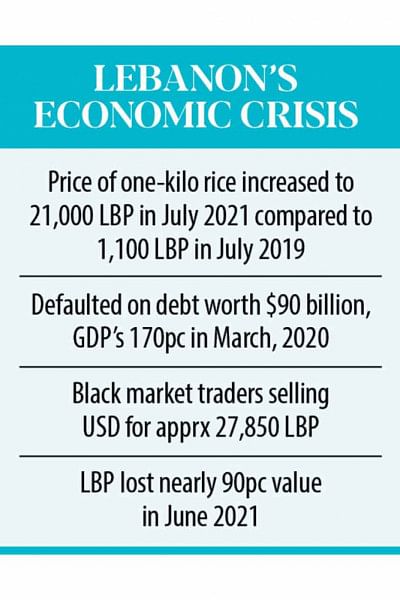Bangladeshi workers struggling amidst economic crisis in Lebanon

Bangladeshi migrant workers continued to face financial hardship in Lebanon, while many found it difficult to remit money home after making ends meet, due to a prolonged economic crisis there.
Because of the Lebanese pound's depreciation against US dollar, many Bangladeshi migrant workers saw their purchasing capacity drop drastically as prices of food and fuel soared.
In August last year, Al Jazeera published an analysis on Lebanon's price hike situation. It showed that in July 2019, one kilo each of rice, chicken, milk (one litre), cucumber, tomato, orange, and apple would cost 10,250 Lebanese pounds (LBP).
Spending the same amount in July 2020, a consumer would get only one kilo each of milk, tomato, and orange. In July 2021, to get one kilo of each of the seven basic items, a consumer was required to spend 90,230 LBP.
According to the Al Jazeera report, the price of one-kilo rice in Lebanon increased to 21,000 LBP in July 2021 compared to 1,100 LBP in July 2019.

Zakir Hossain (39), a Bangladeshi migrant worker in Beirut, said he recently bought a 20-kilo sack of rice at 37,500 LBP per kg.
Pointing to Lebanon's recent parliamentary elections, Zakir said many Lebanese and foreign workers like him were expecting an economic change with the formulation of a new government.
"But there is little hope as of now," he said, adding that he and his wife were barely surviving with their dual income.
Although many companies were supposed to pay foreign workers in US dollars, only a handful of them now pays workers a portion of their wage in US currency and the rest in local currency. The majority of companies pay full wages in local currency, he added.
Lebanon's crisis began in late 2019 after the government announced newly proposed tax schemes, according to an AP report, recently published by Lebanese online media outlet Naharnet.
In March 2020, Lebanon defaulted on paying back its massive debt, worth at the time about $90 billion or 170 percent of GDP -- one of the highest in the world.
In June 2021, with the currency having lost nearly 90 percent of its value, the World Bank said the crisis ranked as one of the worst the world has seen in more than 150 years, reports AP.
Before the crisis unfolded, the Lebanese Pound was exchanged at 1,500 to the US dollar.
On June 29, black market traders in Lebanon were selling the US dollar for 27,850 Lebanese pounds, says a report by Lebanese online news outlet the961.com.
The dollar's current official rate still stands at 1,500 Lebanese pounds, while the bank rate is 8,000 Lebanese pounds.
Towards the end of last year, Lebanon was hosting nearly 1.20 lakh Bangladeshis. Around 20,000 of them were estimated to be undocumented.
Amid the economic crisis, at least 14,000 undocumented migrant workers returned home from Lebanon till 2021 under different voluntary repatriation programmes by the Bangladesh mission.
Mashiur Titu (40), a service technician at a packaging company in Beirut, said he will wait until December this year before considering whether he should return to Bangladesh.
Titu said he told his employer about his financial hardship. In response, he was promised to be paid an additional $100, which came as a relief.
Babu Saha, a Bangladeshi journalist in Beirut, said Bangladeshi migrant workers were having income-generating opportunities but due to the economic crisis, life has become harder for most of them.
In 2019-2020, Lebanon generated $86.99 million in remittance, which dropped to $66.79 million in the following fiscal, according to Bangladesh Bank's data.
In 11 months of the 2021-2022 fiscal year till May, inward remittance from Lebanon was $45.41 million with an average of $4.12 million per month, the central bank data says.

 For all latest news, follow The Daily Star's Google News channel.
For all latest news, follow The Daily Star's Google News channel. 








Comments